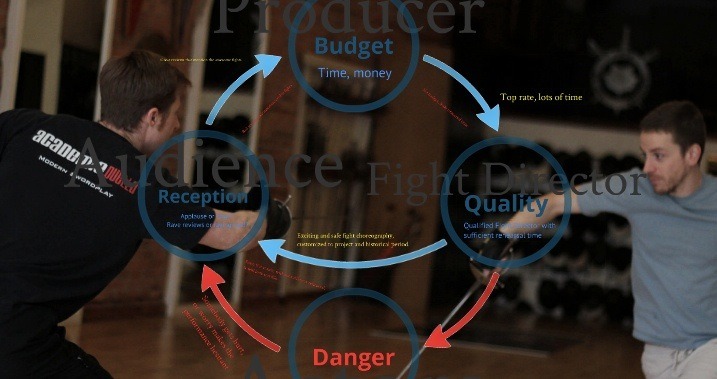If your company has not budgeted sufficiently for fight direction, then you will necessarily have poor stage combat. If you have allocated no budget at all, you have no fights.
Some companies try to get around this by finding a volunteer fight choreographer or a cast member who has taken a workshop one time, but that still only puts you back to poor stage combat.
Your choice is either to cut the violence, or do something that puts actors and audience in physical danger and/or look terrible.
Circumvent
Here are a few strategies to avoid hiring a fight director without risking injury or embarrassment:
- Do a play with no violence.
- Put the violence offstage.
- Reinterpret the movement.
- Think outside the box.
Nice Stories
There are plenty of dramas with no physical violence. To avoid the complications and expense of fight direction, some theatres always choose these nice stories. Vancouver has too many theatres in this category.
Better Not to Look
Like the Greeks, imply that the violence happened off-stage. Use sound effects. You can even have actors on-stage reacting to the sight of horrible things happening just off-stage.
Slow and Surreal
Reinterpret the violence as a dance, or super slow-motion, or some other non-risky choreography. Fighting can be a beautiful physical expression and avoid any safety problem or training for realism by dancing it.
Wow. Mind: Blown.
Be creative: Some films use cartoons, or even still-images in a slideshow or comic-book format, and the old Batman TV show put those big "BAM!" graphics over the risky parts of stage combat. What can you do that's original in film or in live performance?
Feedback Loops
One of the issues we face in fight direction is a downward spiral. When companies budget too little for stage combat, the fights end up looking poor. This is due to hiring someone who has inadequate training and therefore sells their services cheaply, or hiring someone competent, but not giving them enough time to work properly with the actors. If the fights do not turn out well, the company and the public begin to believe that there is no such thing as excellent stage combat, and companies start avoiding shows with any violence so that they don't have to embarrass themselves with bad choreography.
Sadly, this means that excellent fight directors are not in demand, and even those working cheaply are competing for too few shows. When fight choreographers are fighting over the scraps that are made available, they cannot work together to continue improving and evolving stage combat together.
The good news is that the feedback loop also operates in the opposite direction. If you can put on a really excellent show with top-notch stage combat, then people will demand more excellent stage combat. You will get more work, and other fight directors will get more work because companies will want to out perform the bar you set. When more stage combat happens, we can collaborate more and even make legitimate demands on a production and the industry.
We cannot allow budgets and scheduling choke our art. Try to do excellent work even if a company can't pay you well. Demand the time and demonstrate the value of just one more hour of fight rehearsal.
Sometimes the cause isn't the short-sightedness of budgets; sometimes it's due to an amateur who starts selling themselves as a fight director, but creates lots of bad shows. He keeps getting work because he's the only known name and he works cheaply. He floods the market with bad stage combat, and lowers that bar. That's when companies slash their stage combat budgets and the downward spiral starts.
This diagram illustrates what I'm talking about. If one sector worsens, it will likely cause the next one to worsen, and a downward spiral occurs. If one sector improves, then the next one should improve and lead to a reinforcing positive loop.
This is my first Prezi presentation.
Do Awesome Work
I am not discouraging anyone to try stage combat as a choreographer after getting their Basic Actor-Combatant Certification with Fight Directors Canada or another legitimate training venue. I would not be where I am today if I didn't start choreographing friends' shows after a year of study and practice.
But if you want to be a stage combat professional, you owe it to yourself to:
- Do excellent work regardless of the pay. Don't hold back your time or knowledge because the show will suffer and you won't get any positive results from it.
- Negotiate for decent wages up front. They need stage combat, and if you've got the knowledge, don't sell yourself short.
- Acknowledge that one weekend workshop doesn't qualify you to teach or coach anything, even making toast. Basic certification is 60 hours, and that gives you a limited palette of moves and the ability to do them safely. To become an Instructor is about 5 years. So if you want to choreograph and coach professionally, and you need to start right away, just commit to yourself to take the courses to get the minimum standards… even if you're already getting work.
You owe it to yourself. You owe it to your peers within the stage combat community. To accept low pay, and to continue to work without putting in the training time robs all of us of opportunities and wages.
Apart from advocacy, the only part of the cycle you can truly control is your effort in the Quality part of that cycle. Keep doing awesome work and improving, and your wages will improve as audience reception improves.
And if they want to creatively avoid hiring a fight director, let them. The shows you work on will be regarded as superior because you don't flinch away from great combat.
